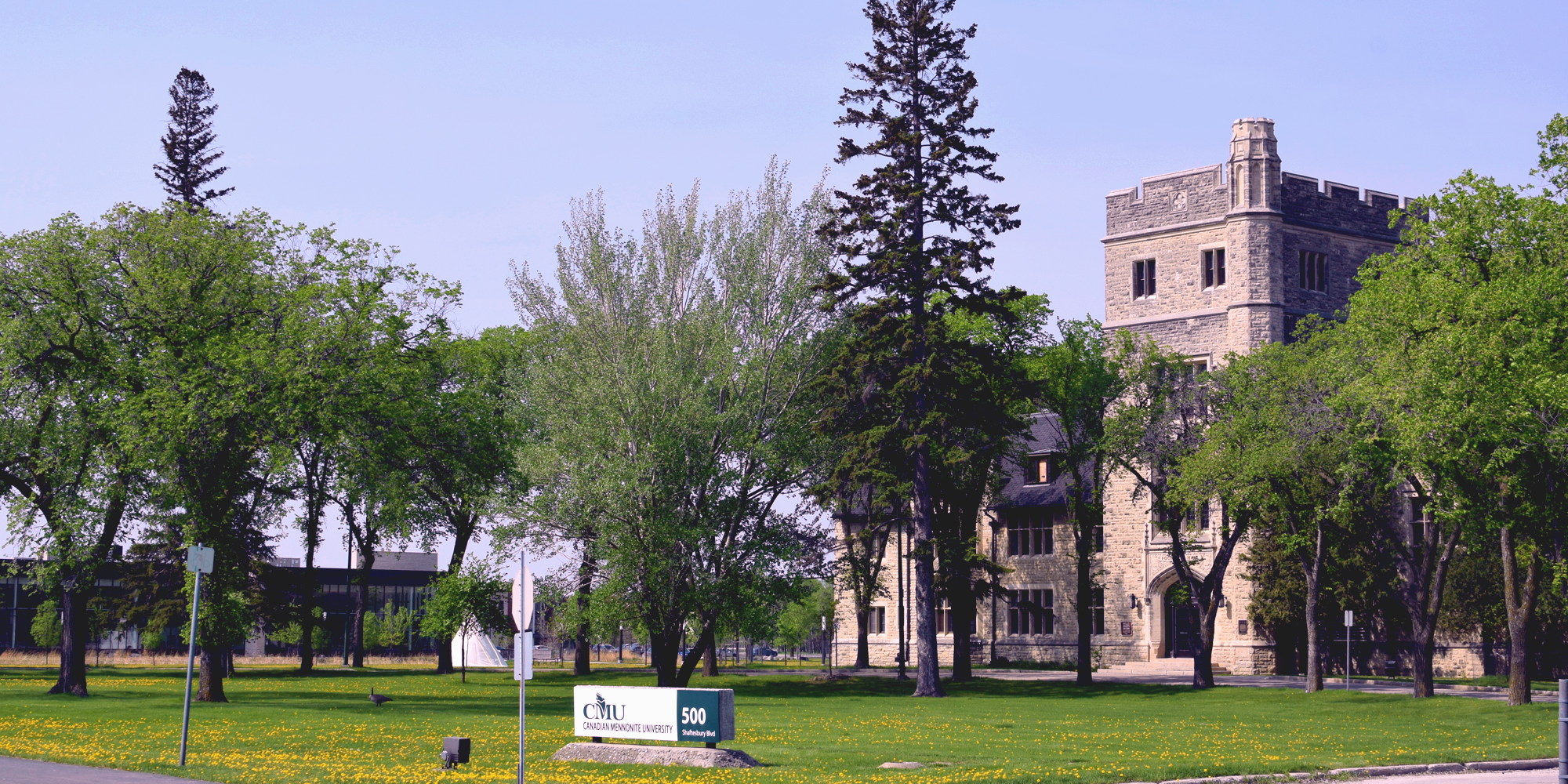Fast Facts
CMU is located on territory stewarded for generations by the Anishinaabe, Cree, Dakota, and Métis people. Our campus sits on Treaty 1 lands, where we access clean drinking water from Shoal Lake 39 and 40 in Treaty 3 territory and use hydro power generated on Treaty 5 territory. We benefit from these treaty relationships every day and are committed to living purposefully as we work towards reconciliation and build meaningful, lasting relationships with Indigenous people and with all of God’s creation.
- Founded: 2000
- Location: Winnipeg, Manitoba (estimated 2022 population of 783,600)
- Type: Comprehensive, liberal arts university programming offering accredited 3- and 4-year bachelor and graduate degrees. See details below.
- President: Dr. Cheryl Pauls, appointed 2012
- Accreditation: In 1998 CMU was chartered with university degree granting status by the province of Manitoba. In 2008 CMU was accepted into Universities Canada, assuring students of degree recognition by other universities and colleges and facilitating ease of credit transfer.
- Religious Affiliation: CMU is formally supported by Mennonite Church Canada and the Mennonite Brethren Church of Manitoba. See Mennonites and CMU.
- Admissions: CMU welcomes all students who meet the university's academic entrance requirements, regardless of racial, ethnic, or national background; religious conviction; gender identity or sexual orientation; social or economic standing; or political affiliation. CMU respects the dignity of each person as an expression of God's love, and commits to fostering a learning community marked by generous hospitality for all people.
- Geographical Representation:
- 77% of students from Manitoba
- 7% of Manitobans self-declare as Indigenous
- 23% of students from other parts of Canada
- 12% of students are from international locations
- 77% of students from Manitoba
- Church Representation: CMU welcomes students from many diverse backgrounds.
- 44% of students are from diverse Ecumenical traditions (Pentecostal, Baptist, Alliance, Non-Denominational, Roman Catholic, Orthodox, Anglican, Lutheran, Presbyterian, Reformed...)
- 37% of students come to CMU from Mennonite or Anabaptist related backgrounds (Mennonite Brethren, Mennonite Church Canada, Evangelical Mennonite Church, Evangelical Mennonite Mission Church, Hutterite Brethren, International Mennonite...)
- 19% of students disclose no faith or church background.
.JPG)
- Undergraduate Degrees: 20 BA majors include Biblical and Theological Studies, Communications and Media, English, History, International Development Studies, Mathematics, Music, Peace and Conflict Transformation Studies, Philosophy, Political Studies, Psychology, Social Sciences, Environmental Studies, Arts and Science (with concentrations in Applied Mathematics, Biochemistry, Biology, Ecology, Mathematics), as well as Bachelor of Science, Bachelor of Business Administration, Bachelor of Music, Bachelor of Music Therapy, and Bachelor of Social Work degrees. Concentrations and minors within these degrees, along with pre-professional studies, vary within programs of study.
- Graduate Degrees: MA degrees in Divinity, Theological Studies, Christian Ministry, and in Spiritual Care; a collaborative MBA; an MA in Peacebuilding and Collaborative Development. Click here to learn more.
- Practica: A practicum component gives students work-integrated learning opportunities through community and work engagement, and provides important links to careers. A practicum is a graduation requirement within all degree programs.
- Faculty: 40 faculty and 50 part-time instructors.
- Student/Faculty Ratio: 1:18 including first- and second-year courses
- Enrolment in 2024/25: 630 FTE (full-time equivalent) students across all programs:
- 596 undergraduate and graduate students at the CMU Shaftesbury Campus
- 75% Manitoba, 25% other provinces and international (from nearly 30 countries)
- 125 FTE Menno Simons College (CMU programming in Conflict Resolution or International Development at University of Winnipeg—see below)

- Undergraduates Living on Campus: Up to 200 students each year live in on-campus dormitory and apartment facilities.
- Scholarships, Awards, and Bursaries: CMU offers over 300 unique scholarships and bursaries to students. In 2023/24, CMU once again gave over $720,000 in scholarships and bursaries to CMU students (58% from annual donor gifts and endowment earnings). Over 50% of CMU students receive financial aid—either scholarships, awards, bursaries, or grants.
- Cost (2024/25 tuition):
see the full tution and fees schedule here- Undergraduate Studies: $640.98 per 3-credit hour course (or $5,127.84 for 24 credit hours)
- Graduate Studies: $899.00 per 3-credit hour course (visit collaborativemba.org for current MBA tuition costs)
- International Students: $1,122.00 per 3-credit hour course (undergraduate and graduate studies)
- Athletics: CMU competes in the Manitoba College Athletic Conference (MCAC) in men's and women's soccer, and volleyball. MCAC includes six universities and colleges in Manitoba: Assiniboine Community College Cougars, Canadian Mennonite University Blazers, Université de Saint-Boniface Les Rouges, Providence University College Pilots, and University of Brandon Bobcasts. The MCAC is a part of the Canadian Collegiate Athletic Association (CCAA), bringing the MCAC teams the opportunity to compete against the best out-of-province teams from across Canada.
- CMU's men's and women's basketball squads also compete in the Northern Intercollegiate Athletic Conference (NIAC) among nine other teams from Manitoba, Minnesota, and North Dakota including Free Lutheran Bible College Conquerors, Nueta Hidatsa Sahnish College Storm, Leech Lake Tribal College Lakers, Oak Hills Christian College Wolfpack, Trinity Bible College Lions, Sisseton Wahpeton College Mustangs, Turtle Mountain Community College Mighty Mikonocks, and Providence University College Pilots.
- Menno Simons College: CMU operates the Menno Simons College program which offers undergraduate programs in Conflict Resolution Studies and in International Development Studies to University of Winnipeg students.



 Print This Page
Print This Page